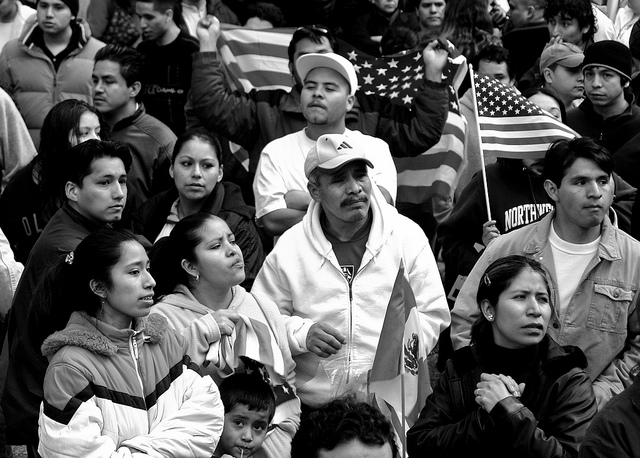Latino Survival In (a Regressing) American Society: Three Components To Increasing Latinos’ Collective Influence

*I often remark about how the stories and issues that affect the Latino community today are in many ways the same issues of the past, repackaged and popping-up anew. Case in point is this Midy Aponte piece written not too long ago, in 2011. In the light of today’s presidential election what Midy says reads fresh, becasue the more things change . . . VL
By Midy Aponte, NewsTaco
Recent developments in Congress confirm that our nation’s political infrastructure is fractured. Our system of government, as it currently stands, has proven to be dysfunctional. Our political parties are no longer in the business of governing. Rather, each party functions as rival corporations, marketing false claims to would-be voters and pandering to Independents in accordance to what issue and poll they may be addressing. [tweet_dis]Neither party, Democrat nor Republican, is effectively representing the interests of their constituents.[/tweet_dis]
While the outlook on the nation’s political landscape remains bleak, the prospect of our cultural fabric is outright terrifying. That collective fear, deep in our bellies, that America is sharply divided into a two-tiered society, the “haves” and the “have-nots,” has been confirmed. As recent findings from the Pew Research Center demonstrate, the “have-nots” are mostly Blacks and Latinos.
[pullquote]For all the struggles we’ve experienced, we are a privileged group of people. [/pullquote]The consequence of this disparity is evidenced throughout our social order.
From healthcare to education, immigration and economics, the “have-nots” are disproportionately affected by policies that have been thwarted to protect those with vested interests. And society-at-large is too distracted with ideological, theological, and philosophical arguments while the wealth gap widens and erodes the middle class.
Though these patterns of behavior have dominated American society for generations, a strong and palpable undercurrent is rising among multicultural communities. The belief that our country is regressing to a disturbing place defined as social marginalization at best, and caste system at worst.
The conversation about the Hispanic Boom has been had, for decades.
And still, Latinos lack collective influence. We may be a large voting bloc and may be vocal on policy issues (immigration, DREAM Act, etc.) but our efforts to activate power that lead to policy changes have fallen short. We may have a $1.3 trillion purchasing power, but we’ve added to Wall Street’s perception that our spending habits lead to irresponsible debt. [tweet_dis]We may be a diverse and culturally textured community, but we are still viewed as caricatures in mainstream society.[/tweet_dis]
Perhaps the Latino community’s survival is contingent upon converging two distinct American systems of thought: 1) secure collective influence by 2) exercising individual responsibility.
How the systems converge
1. To have collective influence in society, we must have wealth. To amass wealth, we must each individually save. To do this, we can no longer allow our purchasing power to be exploited. For far too long we have bought into the false notion that having “things” represents substance. Wall Street has been exploiting this vulnerability for years and government has sat idly by, indifferent that our “pursuit of happiness” led us to be indebted to mortgage companies, auto loans and credit cards.
2. To have collective influence in society, we must show value. The national dialogue on the Latino community is dominated by references to our increased population size. Yet, however impressive as these numbers are, they have little impact if they are not paired with data pointing to our fiscal and knowledge-based contributions to society. As corporate executives, political leaders, academic scholars and small business owners, the case for our collective influence is best made when matched with details on corporate leadership we secure, policies we spearhead, innovations we create, and businesses we pioneer.
3. Lastly, to have collective influence in society, we must evolve. The life experience of a bicultural Latino is rife with cultural and generational tension. Many of us are caught between the traditional values of our heritage and mainstream norms perceived as “too Americano” by our parents. In truth, there is a responsibility to being an American and it’s not just paying taxes. The ultimate potential of the American Dream is satisfied when individuals harness the strengths of their cultural identity, shed mindsets that hold them back, and actively participate in the pursuit for upward mobility.
There is no sugarcoating the current state of our reality. The Latino community is at a crossroad in our nation’s history. However, we do “have” all the ingredients to become a formidable influence in American society. For all the struggles we’ve experienced, we are a privileged group of people. We are framed with layers that add dimension to our thinking, and are emboldened with a drive to leave our mark on the national tapestry. The power to do so lies within each one of us.
Midy Aponte is vice president at Spitfire Strategies, reporting into the agency’s San Francisco office. She’s most recognized for her community influencer and leadership abilities, Midy Aponte is an accomplished communication strategist intent on delivering meaningful results that connect all types of audiences: corporate representatives, political thought-leaders, community advocates and next-generation influencers.
[Photo by Víctor Manuel Espinosa/Flickr]
